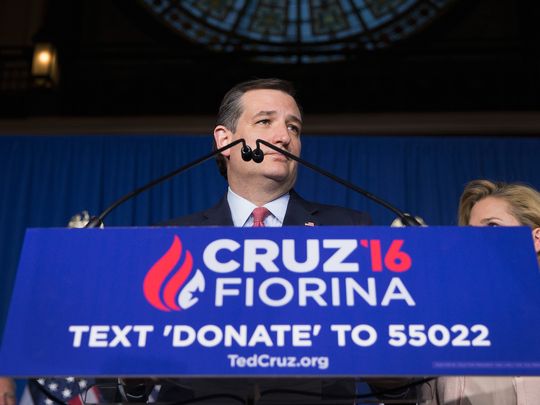First Take: Ted Cruz ‘too strategic for his own good’

Less than a month ago, Ted Cruz was flush with confidence from a big win in Wisconsin and poised as the biggest threat to derail the runaway campaign of Donald Trump.
Then, an awkward alliance with GOP rival John Kasich happened.
And a more awkward naming of Carly Fiorina as his running mate, even though he trailed Trump in delegates.
And then the former speaker of the U.S. House called him “Lucifer in the flesh.”
Talk about a rough week.
On Tuesday night, Cruz called it quits after Indiana Republican voters overwhelmingly chose Trump, putting the race out of reach and ending the candidate’s goal of forcing a contested convention.
The concession ended 13 months of a campaign from the Texas senator that repeatedly defied naysayers and shone in its organizational prowess. But what it had in strategy and organization it lacked in staying power and broad voter excitement for a candidate that is broadly disliked — from Republican colleagues to Democratic opponents. While Trump steadily expanded his universe of supporters, Cruz couldn’t budge past his core constituents, mostly Tea Party activists who favored his prickly outsider persona and threats to disband the IRS.
“Cruz stayed in the same place while Trump was able to gradually move ahead,” said Mark Jones, a Rice University political scientist who followed the Cruz campaign closely. “When push came to shove, Republican primary voters didn’t go stampeding for Cruz.”
Cruz’s chameleon-like quality allowed him to weave and glide through one of the most crowded GOP races in history. His Princeton-sharpened debate skills made him a formidable foe on stage through one televised debate after another, bringing the persona of a principled Republican leader into millions of living rooms.
But that deft maneuvering also led to his undoing. Voters noticed when Cruz initially chummed up with Trump, then a few months later denounced him as a pathological liar. His backroom dealings to win delegates in some states gained media attention. The beginning of the end seemed to come last week when his campaign announced a baffling alliance with Kasich over Indiana votes that fizzled as quickly as it started.
Each time, Trump pounced, dispatching disparaging missives to his millions of Twitter followers and using Cruz’s maneuvers to bolster his narrative of a rigged system.
Cruz persisted, buoyed by the fact that he had outlasted most other rivals and a contested convention was in sight. He stayed on point and hammered Trump with a discipline seen in few other candidates. But voters weren’t buying it. His standing among Republican voters plummeted from 61% who had a favorable outlook on him in January, to 39% this week, according to a Gallup poll released Tuesday.
The Republican establishment had little choice but to back Cruz, terrified at what Trump in a general election might do the party’s long-term health. Republican Sen. Lindsey Graham described the choice between Trump and Cruz like "being shot or poisoned." But as the polls widened and Trump pulled ahead, that wasn’t enough. Cruz’s maneuvering, the perception of his win-at-all-costs style, didn't sit well with voters or chunks of the establishment needed to win.
“Republican elites are probably wondering what might have been if the person to rally around wasn’t Ted Cruz but someone like Marco Rubio,” Jones said.
He added: “He was too strategic for his own good.”
Политика конфиденциальности | Правила пользования сайтом







